Lion works in close coordination with employees and the Lion Health Insurance Society to support the formation of healthy habits—in such areas as lifestyle, oral heath, mental health, cancer prevention and anti-smoking—based on the Guidelines for Health, with the goal of realizing healthy minds and bodies for all.
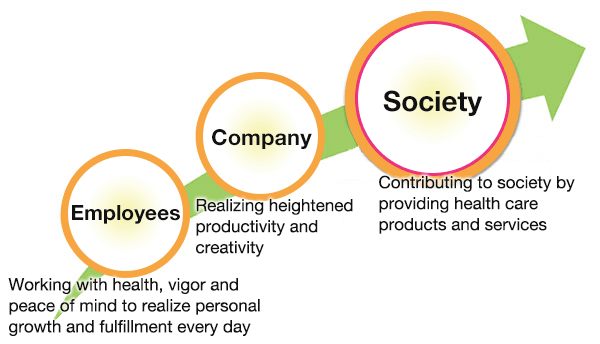
We are implementing Lion-style health support, “GENKI” Action, to promote the formation of healthy habits. We support our employees’ autonomous efforts to cultivate their strengths regarding their health, thereby empowering them to demonstrate their diverse abilities.
Based on the three pillars of deepening health management, transforming health behaviors into habits and improving health literacy, we strive to promote preventive dental practices, cancer prevention, and the visualization of lifestyle habits through the use of health management systems, thereby improving productivity by increasing job satisfaction, ambition, and the motivation of each and every employee and strengthening the foundations of our health management.

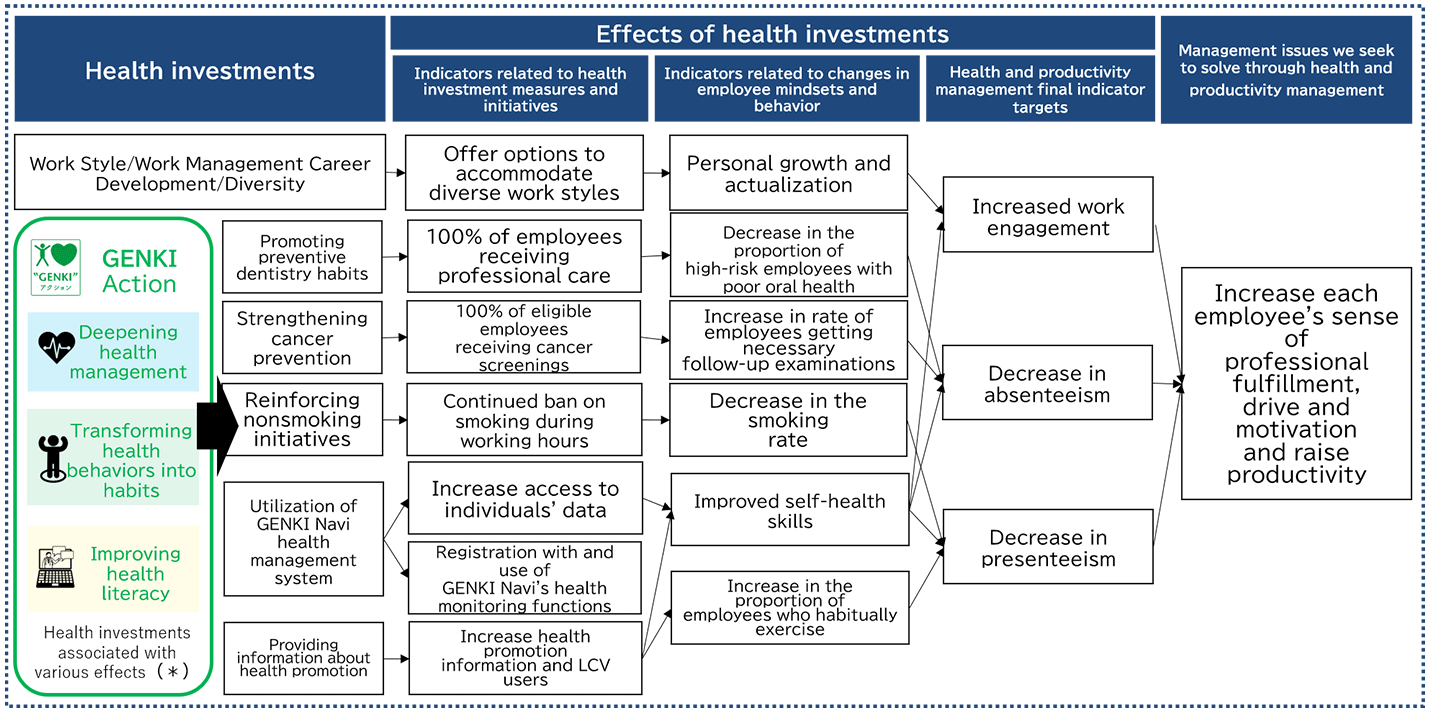
* Generally, health investments correspond one-to-one to the indicators related to health investment measures and initiatives. However, some health investments correspond to multiple indicators related to health investment measures and initiatives. These health investments are deemed “health investments associated with various effects.”
Lion promotes health management through cooperation between the Health Support Office and the Lion Health Insurance Society, led by the officer responsible for Company-wide health and productivity management. Health Support Offices are located in all 11 districts and are staffed by industrial physicians and nursing personnel. The Health Support Office in each region operates and promotes health maintenance and promotion measures in cooperation with the Head Office. The Head Office Health Support Office is responsible for developing Company-wide policies and plans and compiling statistics. We are committed to being a vibrant company through the systematic management of our employees' healthcare.
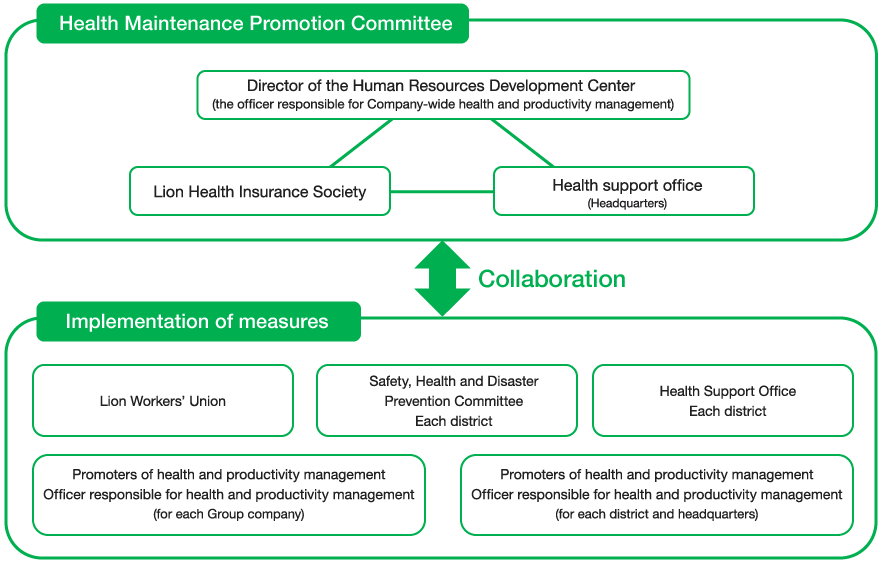
As part of our “GENKI” action activities, we have positioned the use and evolution of the GENKI Navi health management system, the promotion of preventive dental habits, and the strengthening of cancer prevention and smoking cessation as priority measures. We are also focusing on the visualization of lifestyle habits and the dissemination of information. Our total investment in these measures amounted to 12 million yen in fiscal 2024.
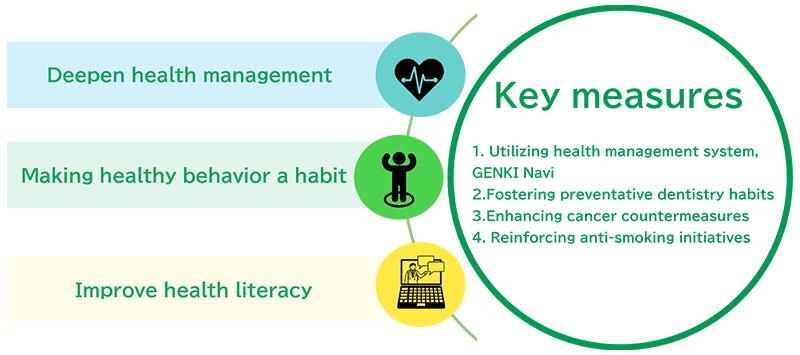
The health management system GENKI Navi was developed based on the concepts of “visualization,” “self-assessment,” and “enjoyable health promotion,” and is accessible from PCs and smartphones. With the aim of transforming health behaviors into habits and improving health literacy among employees, from April 18, 2022, we added a function that uses employees’ health checkup data to clearly present future health risks. Through this function, employees are able to reflect on their living habits and change their behavior.
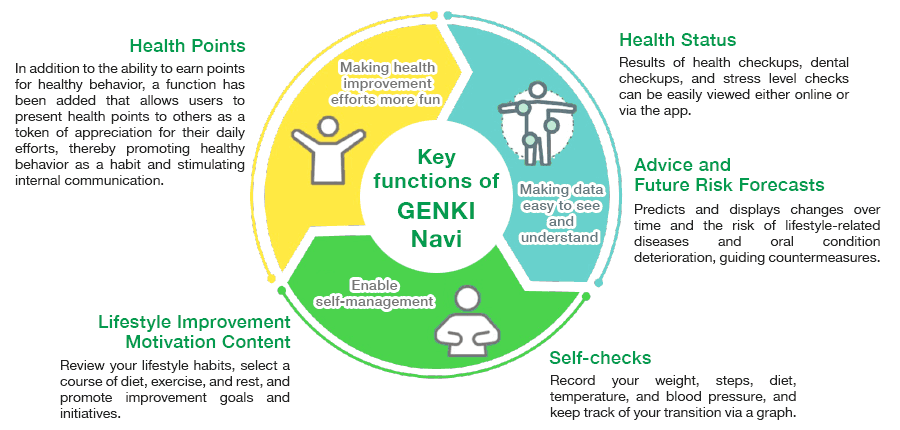
* An approach focused on prevention, rather than receiving treatment after cavities or other problems arise. This approach entails both receiving professional care at a dental clinic and practicing daily self-care on an ongoing basis.
Since the 1970s, Lion has continuously implemented preventive dentistry measures.
Since 2002, in collaboration with the Lion Health Insurance Society and the Lion Foundation for Dental Health, Lion has conducted All Lion Oral Health Activity (ALOHA), aimed at increasing employees’ oral health management abilities. Currently, the program is continuing over the long term as “ALOHA Ⅷ” with a PDCA cycle. The percentage of employees who brush their teeth after lunch increased from 53% in 2002 to 80% in 2024, and the prevalence of periodontal disease with periodontal pockets of 4 mm or larger decreased from 33% to 27%.
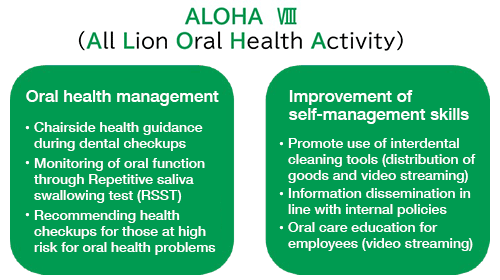
To make the practice of preventive dentistry easier for employees, we offer periodic, time-limited incentive campaigns for dental clinics where they can receive regular professional oral care. In addition to communicating the need for professional care examinations, the program provides participants with stickers bearing an original logo and computer background images to use when working remotely to inspire them to want to see a doctor. As a result, the professional care consultation rate in 2002 was 10%, but by 2024, it had increased to 56%.
In 2021, Lion introduced a cost subsidy system for more accurate cancer screening and holding seminars to improve employee cancer literacy.
From 2024, the Lion Health Insurance Society has also launched a system to subsidize the cost of medical examinations provided to those who reach the age of 40 and older. These efforts have earned the company an award for excellence in cancer prevention for three consecutive years since 2022.
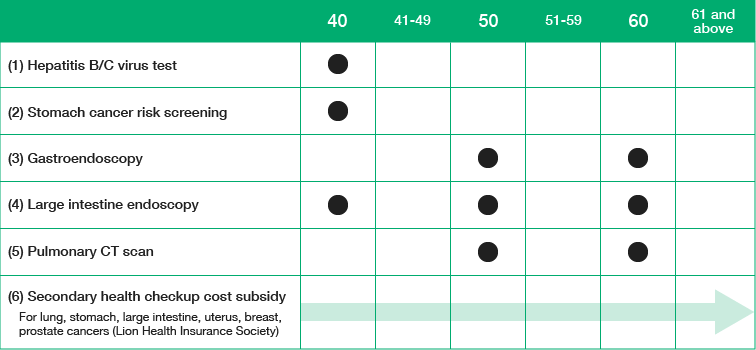
We provide support and have created facilitative environments for employees who want to quit smoking in order to prevent exposure to secondhand smoke in the workplace. To improve work environments, in January 2020 we banned smoking during work hours, and in April 2020 we implemented official rules banning smoking indoors. Furthermore, since 2022, the Lion Health Insurance Society has continued its efforts to encourage people to quit smoking through a subsidy program for visits to smoking cessation clinics.
In order to promote preventive dentistry, we offer oral care seminars for outside companies in addition to our own.
Click here for more details. [Japanese]